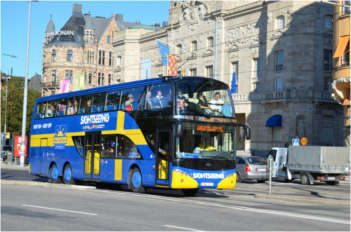England's major transport authorities have carried out what is thought to be the country's most comprehensive study into Scandinavian transport and concluded the UK has much to learn.
The Urban Transport Group, whose members include Transport for Greater Manchester, Transport for London and the West Yorkshire Combined Authority, looked enviously at their Scandinavian colleagues, in particular how devolved powers have been used to transform public transport.

A bus in Stockholm, Sweden
The Scandinavian Way to Better Public Transport report highlights several 'striking examples of Scandinavian success and ambition' after carrying out research into Sweden, Denmark and Norway. These include:
- A doubling of public transport patronage since 2000 in the Swedish region of Skåne (which includes Malmo) following major investment in the network
- Investment in Metro and suburban rail services a key part of Copenhagen’s plan to be the first city in the world to be CO2 free by 2025
- Between 28 and 38% of tickets sold in the Oslo/Akershus urban area are by mobile phone
The report argues that the key characteristics of Scandinavian public transport include:
- high frequency services, high quality vehicles and good off-peak provision
- smart and simple multi-modal ticketing delivering excellent value for money in comparison to incomes
- much higher bus ridership per head than in the UK, and much higher funding per head except in Swedish cities
- ambitious plans for public transport’s role in reducing carbon and toxic emissions
- public transport strategies that align with wider national and sub-national goals for economic development, land use planning and social cohesion
- significant innovation including on vehicle technologies, smart ticketing and customer service
Report author Professor Tom Rye of Napier University said: 'This is the most comprehensive study into the Scandinavian models of transport policy ever undertaken in this country. The data my team and I have gathered, assessed and put into context for UK policy makers shows a clear road map for improvement in the way the UK transport service providers currently deliver urban public transport.'
Tobyn Hughes, managing director of Nexus and chair of the Urban Transport Group, said the Scaninavian countries were 'moving quickly towards new smart ways of paying for access to transport, phasing out diesel buses to improve air quality, and investing heavily in more and better tram, train and bus services'.
He added: 'They are able to do this because by and large they have the powers they need to plan and develop their local transport networks.'
At least some of those powers have been devolved to certain English local authorities with the Buses Act, which allows councils to introduce bus franchising models similar to London's, but only in certain circumstances.
Mr Hughes said: 'Franchising is the norm for bus services in Scandinavia and has been instrumental to the delivery of integrated, high quality and successful bus services in an efficient way.'
The Urban Transport Group report was written by Professor Tom Rye of the Transport Research Institute at Edinburgh Napier University, with research support from colleagues from Lund University, K2 Swedish National Public Transport Research and Knowledge Centre, the Inno-V consultancy (Netherlands) and Urbanet (Norway).
Register now for full access
Register just once to get unrestricted, real-time coverage of the issues and challenges facing UK transport and highways engineers.
Full website content includes the latest news, exclusive commentary from leading industry figures and detailed topical analysis of the highways, transportation, environment and place-shaping sectors.
Use the link below to register your details for full, free access.
Already a registered? Login